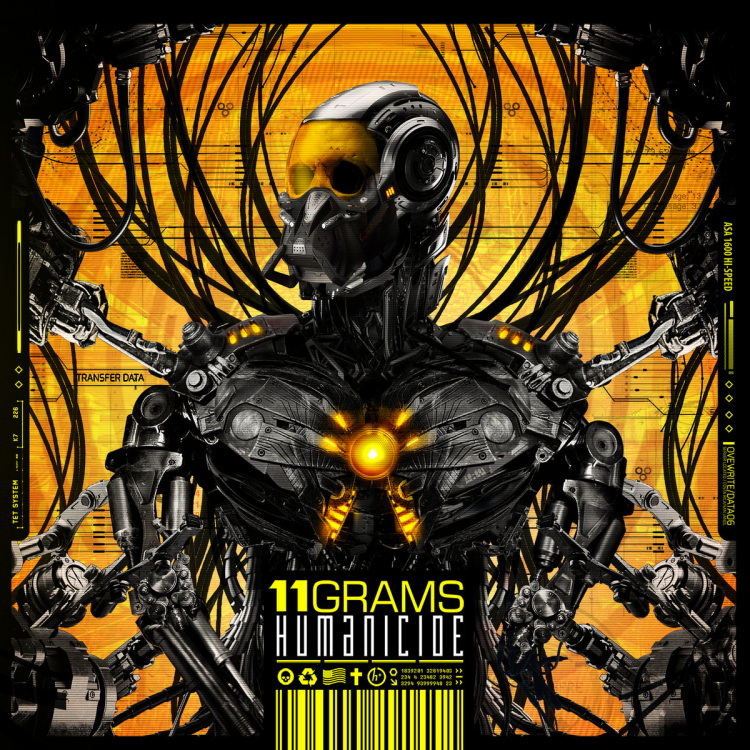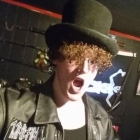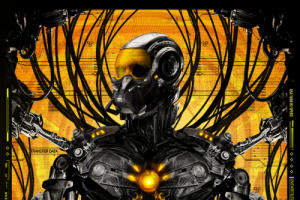Hello 11Grams and welcome back to Brutal Resonance! It has been about three years since your last album launched. Throughout the time since “Panacea” launched, have you two found it easier to get into the flow of working with one another?
Simeon: Yes I think so, with "Humanicide" the song construction came easier. We had a more structured idea for the album from the get go and 'Iceman', being the first track completed, gave inspiration to write more.
Rob: We had a much better feel for each other’s strengths and weaknesses, so although we both contributed equally to the music we were able to define roles a little bit more.
I always find it interesting to talk about the cover art of an album as it provides insight before even venturing into the music. A cybernetic suit is being built around a skeleton with typical sci-fi cables running all over the place. What is this supposed to mean, if anything? And who designed the cover art?
Simeon: The skull represents a human element inside the machine, plugged into the system for reboot and repairs, I guess it's a bleak vision of the future. The mastermind behind the cover art is the creative Vlad McNally.
Rob: "Humanicide", and the artwork, represents humanity being controlled/dependent on the machine. We may live longer due to technology but for what or for who?
From 2017’s Panacea to now, what new production techniques did you incorporate into “Humanicide”? Were there any mistakes that you tried to avoid from lessons learned on working with “Panacea”?
Simeon: Myself, production techniques didn't really change from the previous album. I like to use my equipment to its full extent and knowing where everything is just makes the process easier to create. Software these days is amazing and with unlimited capabilities, what I find gratifying more so is creating new sounds from old ones. Sound restoration; taking something old and making it new and fresh. As for mistakes, we listened to these songs hundreds of times until we were both happy with the final version. "Panacea" was a learning curve but still had a good outcome, I think we were excited to release something and may have rushed it but you gotta start somewhere.
Rob: On "Panacea", sound creation for me was either samples or soft synths. On "Humanicide", I used hardware synths as well, starting with a Waldorf Blofeld I bought while playing in Australia in 2018, and then expanding to a Behringer Neutron, Access Virus and Korg Minilogue. I’ve been programming synths since the late 80’s and have had a ton of hardware through the years but sold it all in the early 2000’s in favor of software. To fuel my creativity and passion, I wanted to get back to what I enjoyed in my early years. As far as mixing and mastering, I’m still using all software however the software is so good these days I don’t feel a need to use hardware. My go-to software for mixing/mastering is from SSL, Slate Digital, Softube, Soundtoys, Izotope and a few others.
Tell me how you guys go about making a song. Is there a set standard of rules? Does the music come first and then the lyrics? Or vice versa? Do improvisation sessions play a big role in electronic production?
Simeon: No rules per se but a general repetition of construction techniques, drums, bass, lead melody. Make the groove then fill it in, continue dynamic progressions and polish it with a mix and master. Vocals seem to come later, but not always.
Rob: I would say drums and bass usually come first. This gives us a general direction for the song. From there the songs sort of write themselves as we pass files back and forth over the internet. We occasionally may ask the other not to change a certain aspect of what we’ve done but mostly we are free to change, delete and add anything we want, so the songs really are a representation of both of us. When we ask a guest vocalist/lyricist to join on a song we respect their creative input as well by letting them change the arrangement to better fit their parts.

You have several collaborations on the album with Roy Retrofit, Alicia May, Rebekah Fang, and Sarah Myers. How did you meet each one of these individuals and what did they bring to the table that 11Grams couldn’t do on their own?
Simeon: Roy Retrofit, I met for the first time at Rob's place in D.C., him and his partner Ada visited while we were rehearsing for our gig the following night, Roy and Ada's band "Red This Ever" were extremely entertaining and an unforgettable night we all had.
Alicia May and Joey(Snvff) were the headline act at our gig in Brisbane, Australia when Rob came over to visit, we all had an amazing night. Alicia has an amazing voice; she absolutely nailed the vocals on 'Weaponized' which was fantastic to work with.
Rob: I know Sarah and Rebekah from the Washington D.C. music scene. Sarah (aka DJ Spookster) is a local DJ that has spun at DC area club nights such as Vanguard and Dark & Stormy, and she is also a vocalist. She sang on some yet-to-be-released Retrogramme songs as well. Rebekah is in a DC-based dreampop band called The Neuro Farm. They have a bit of an 80’s and early 90’s 4AD sound to them, which I absolutely love.
There are nine original tracks on the album. And I always like asking this question as it’s a tough one for some producers. It’s like picking a favorite child. Anyway, out of all the songs on the album, which one is your favorite?
Simeon: That is tough, after listening to them on repeat for the past two years and still not bored, They're all good. But if I have to choose one it's 'Iceman'.
Rob: 'Genetic' has a special place with me because it’s the only song I’ve written lyrics for, and it was written during a tough few months in my life. I’m not sure if its my favorite, but I am most proud of it.
So far reception for the album has been positive from what I have seen. How do you feel about reviews and the like? Do they effect morale if they’re negative or is it something that you can easily shrug off your shoulders?
Simeon: The reviews have been very positive so far and that puts a smile on your face knowing that people are enjoying your efforts. Negativity isn't really an issue for me; everyone is entitled to their opinion sometimes negative comments can be inspiring to do better.
Rob: First and foremost, I am a fan of music. When I feel an album is ready to be released, it’s because I feel good about what we’ve done. I want to be able to listen to an album outside of the studio and enjoy it. That’s my priority. I love when other people enjoy it as well and I love to hear their thoughts, but most importantly it has to represent what I personally love about music.

2020 is coming to a close, and with live shows out for the most part, what else do you have planned for the year? Do you have any EPs, singles, or remixes in the works that you can talk about?
Simeon: At the moment we're releasing singles from "Humanicide", all our friends who did remixes plus some songs that didn't make the album. Rob and I are doing a remix for Australian band Dirt Factory, and it's shaping up nicely.
Rob: I often produce, mix, and/or master albums for other bands, so I’m sure there will be more of that in 2021 in addition to writing more original material and remixing other’s songs.
I asked this in our previous interview, but Retrogramme and Project K11 are both personal projects of yours. Are they put on the side for now or have you been steadily working on them?
Simeon: Project K11 is always doing something. Remixing is probably most of my time but original song ideas are always being created.
Rob: I’ve been sidetracked a bit from Retrogramme over the last year or so to complete "Humanicide" and also produce/mix several other bands, but I hope to get back to Retrogramme.
Lastly, I’d like to thank both of you for your time and wish you the best of luck with the new album. Cheers!
Simeon: Thanks Steven, hope you enjoy our new release.
Rob: Thanks for your time, it’s an honor to talk with you!

Steven Gullotta
info@brutalresonance.comI've been writing for Brutal Resonance since November of 2012 and now serve as the editor-in-chief. I love the dark electronic underground and usually have too much to listen to at once but I love it. I am also an editor at Aggressive Deprivation, a digital/physical magazine since March of 2016. I support the scene as much as I can from my humble laptop.
Share this interview
Facebook
Twitter
Google+
Shares
Popular interviews
Psyclon Nine
Interview, Mar 24 2017
Night Runner
Interview, Oct 13 2016
Testube
Interview, Apr 02 2022
Kite
Interview, Feb 10 2017
God Destruction
Interview, May 17 2016
Related articles
11grams
Interview, Oct 07 2017
David J Bull
Interview, Feb 21 2022
Code 64 - 'Trialogue'
Review, Aug 26 2010
Static - 'Let It End'
Review, Jan 01 2024
Reali-tGlitch - 'Netherworld Principle'
Review, Oct 02 2022




